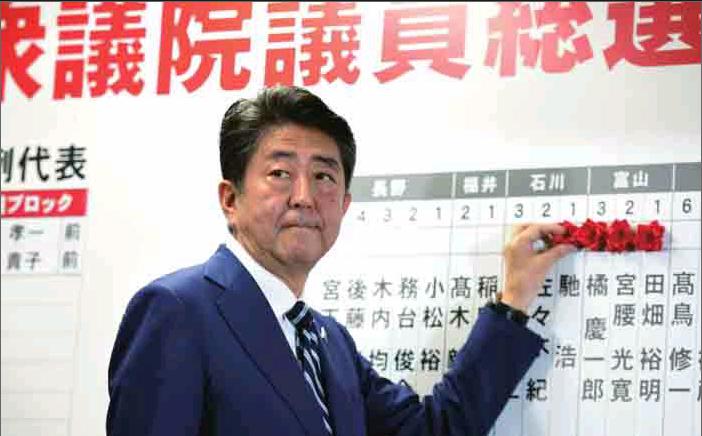A Lost Opportunity
2017-11-27ByShiYongming
By+Shi+Yongming

Japan just concluded its 49th general election of members of the House of Representatives, the lower house of Japans national legislature, in late October. Called at short notice, the event lacked suspense. Although the Party of Hope (PoH), led by newly-elected Tokyo Governor Yuriko Koike, at one point posed a threat to Prime Minister Shinzo Abe, in the end, the ruling camp comprising the Liberal Democratic Party (LDP) and its junior partner, the Komeito Party, won two thirds of the votes.
Japans media attributed such a result to the feckless opposition. As a matter of fact, the failure of the opposition just reflects a loss for the whole of Japanese society. Under such circumstances, people usually have two choices: one is to keep silent for the sake of stability; and the other is to call for reform, which may lead to disorder. Obviously, most voters chose stability and voted for the LDP despite not liking Abe very much. The electorate would rather stick with the unsatisfactory LDP and continue in the clichéd political rut than vote for the PoH, which had no clear political direction. So by this election, Abe has won the opportunity to realize his political ambitions.
An anti-democratic election
Abe has actively promoted values diplomacy in international relations as if he were a spokesperson for the Western concept of“universal values.” However, his domestic governance actually goes against the values he promotes in his diplomatic rhetoric and betrays the essence of it.
In Western governments with a minis- terial cabinet, the head of government is usually empowered to dissolve parliament when division of opinion emerges between the executive head and members of the legislature. And through re-election, the government can gain popular support, guaranteeing democracy in these nations.
However, Abe dissolved parliament not because of differences of opinion between the various parties. As the LDP enjoyed an absolute majority in the lower house, it could easily neglect objections of opposition parties. For example, new security laws were passed in 2015 after fierce wrangling and strife, and the ruling bloc rammed through an amendment to the Law on Punishment of Organized Crimes on June 15 this year without discussing it with opposition parties.
Then why did Abe call the snap election, as it was unnecessary and a total waste of public resources? The answer is: to shirk the political and legal repercussions of scandals related to illegal transfer of state assets to private organizations. The Moritomo Gakuen and Kake Gakuen scandals negatively affected Abes image, dragging his support rating down to 26 percent, a new low during his second term as prime minister, while raising his disapproval rating as high as 56 percent.endprint
